High Court Candidates Blast Each Other
Challenger James Daley calls incumbent Supreme Court Justice Ann Walsh Bradley a liberal, while she cites Republican Party functions he attends.
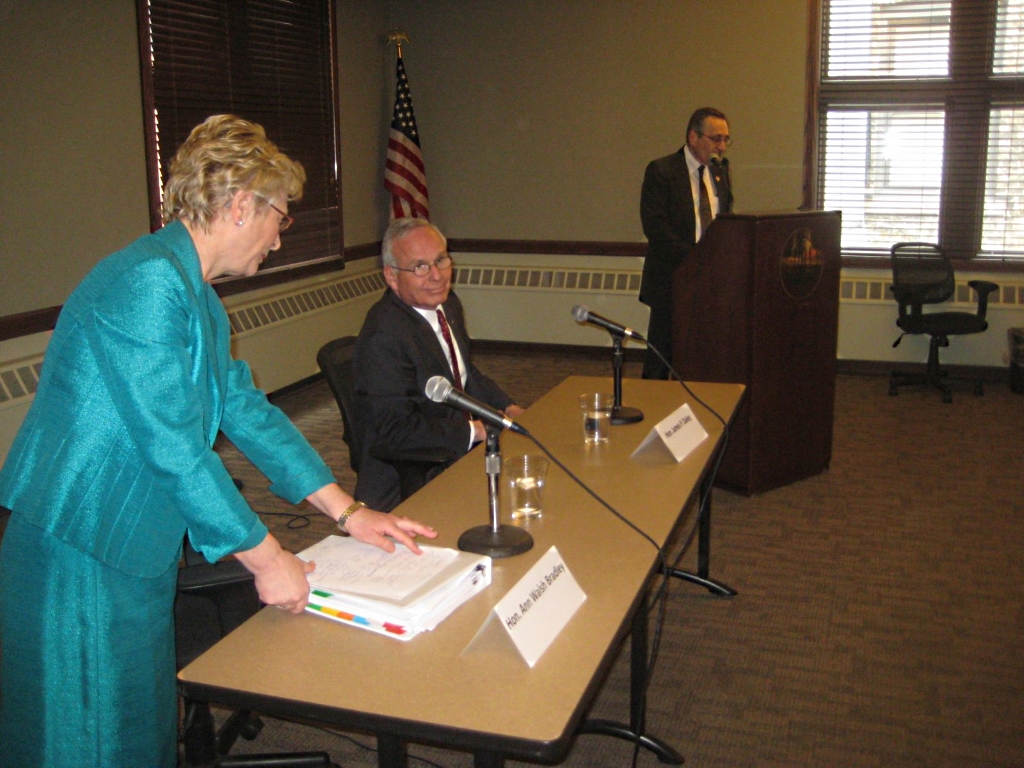
Supreme Court Justice Ann Walsh Bradley and challenger James Daley, a Rock County Circuit judge and Chief Judge of the 5th Judicial Circuit, who is challenging incumbent prepare for the forum. Photo by Michael Horne.
The two candidates for the Wisconsin Supreme Court offered differing views on the role of the court and of outside influences on judicial elections Thursday at a forum sponsored by the Milwaukee Bar Association.
Challenger James Daley, a Rock County Circuit judge and Chief Judge of the 5th Judicial Circuit, who is challenging incumbent Supreme Court Justice Ann Walsh Bradley said he is “not a judicial activist,” and would “not legislate from the bench.”
Until the last decade or so, these concepts were rarely raised in a non-partisan supreme court election in Wisconsin. But the terms have become code words used by right-leaning groups to signal the liberal-conservative schism that divides the nation’s two major parties and has increasingly entered the judicial realm. According to the Heritage Foundation, “Judicial activism occurs when judges write subjective policy preferences into the law rather than apply the law impartially according to its original meaning.”
Bradley, who is seeking her third ten-year term on the bench, shot back with a quote she attributed to former U.S. Supreme Court Justice Sandra Day O’Connor, who warned that those “activist judge” arguments are “cheap and easy” ways to introduce political agendas into judicial campaigns where they do not belong.
Bradley also said the proposed amendment to the state constitution changing how the Supreme Court Chief Justice is selected is another example of political issues being improperly introduced into the judicial selection system by outside interests.
The amendment, passed with exclusively Republican support in the legislature, and now up to the voters to approve or reject via referendum in the April 7 election, calls for sitting justices to select their chief for a period of two years. Currently, the Chief Justice is the member with the most seniority, and that is Justice Shirley Abrahamson, 82, who was elevated to the position in 1996 after serving on the court for 20 years.
Daley says he supports the amendment, suggesting it will give the voters a say, via the justices they elect, as to who will be the court’s leader, rather than rely on seniority. “Some have said this is an attack on the status quo,” Daley said, adding that the status quo “should be attacked.”
Bradley, who is second in seniority to Abrahamson, disagrees. “I will vote ‘no’ on the amendment she said. “It’s an attack on Chief Justice Shirley Abrahamson — not on the status quo.” She called the amendment “a tool for political payback” that would “overturn the will of the people and negate their vote.” People who voted for Abrahamson at her last election in 2009 knew she was the Chief Justice, she said.
Bradley, who came to the forum with a binder of notes, cited former Justice Janine Geske, who cautioned that to change our constitution because you don’t like the style of an individual person would be a great mistake, she said.
Daley says the “will of the people will be expressed by the people” in the amendment. Right now, he said, the court is dysfunctional. “My opponent is a central part of the dysfunction by opposing the constitutional amendment,” he said.
Bradley was quick to respond to the “dysfunctional court” argument, which has been another Republican talking point. She said that when Daley was asked by a reporter last December to cite the cause of the dysfunction, he answered, “I don’t know.” The reporter then asked specifically if Bradley was responsible for the court’s dysfunction. “I can’t say that,” he responded then.
The issue of funding of the campaigns was raised. Daley has received $7,000 from the Republican party for his campaign. But he said, the party was not running his campaign. Daley called his opponent a “liberal.”
Bradley responded that such partisan labels “have no place in judicial races.” But she suggested that Daley’s campaign indeed shows a partisan slant toward the Republicans.
“Well, I meet in public,” Daley responded, while Bradley “meets behind closed doors with John Chisholm, the Democratic District Attorney.”
Bradley retorted, “I can assure you I’ve never met behind closed doors with John Chisholm or any party officials.”
Wisconsin is second among states in special interest group spending in judicial races, she said, cautioning that this is a disturbing development.
Daley retorted “it is a First Amendment issue.” He said he would accept lawful donations to his campaign, and would not be swayed by the donors if they had a case before him. “I don’t ask for donations — I can’t,” he said, citing judicial campaign ethics. “I have nothing to say about third parties [that contribute to his campaign]. That is out of my control.”
Bradley said that “just because [a donation] is legal does not make it O.K.” She said “I told my campaign committee that we must go to a higher standard. I will not solicit or accept money from any party or attorney who appears before the court,” she said.
She added that she dissented from an opinion by the court that now permits direct solicitation of money from parties before the court, citing it as a troublesome precedent.
About the Forum
The Milwaukee Bar Association’s forum was one of four scheduled between the two candidates. For the past 15 years the association has sponsored the judicial discussions to help inform the electorate. Judge John DiMotto, the bar’s Judicial Spokesperson, was the host of the event and made the introductory remarks. He noted that the forum was open to the public and the media. The bar association members will vote on the candidates’ suitability for office in a poll that will be released before the election. Such polls are usually also conducted for Circuit Court judicial candidates, of which there are 12 seats on the ballot April 7th. However, 11 of the sitting judges whose terms are up are unopposed, while there is only one candidate — David Fleiss — for the sole open seat. Fleiss was at the event as were judges Clare Fiorenza, J. D. Watts, Michael Dwyer, M. Joseph Donald, Timothy M. Witkowiak and Christopher Dee, all up for re-election and all unopposed.
The event was moderated by Steven Walters, the Wisconsin Eye producer and Urban Milwaukee columnist. Walters reminded the attendees that at the last comparable election, in 2013, the statewide turnout was just 17 percent of voters.
Photos from the Forum
Plenty of Horne
-
Milwaukee Modernism Gains National Awards
 Dec 15th, 2025 by Michael Horne
Dec 15th, 2025 by Michael Horne
-
New Rainbow Crosswalks Mark Milwaukee’s LGBTQ+ History
 Oct 8th, 2025 by Michael Horne
Oct 8th, 2025 by Michael Horne
-
Welcome Back, Tripoli Country Club!
 May 27th, 2025 by Michael Horne
May 27th, 2025 by Michael Horne


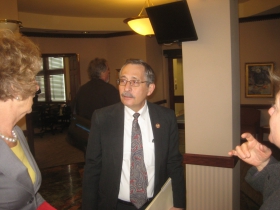
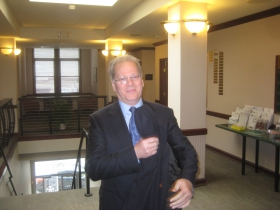
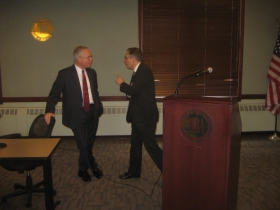
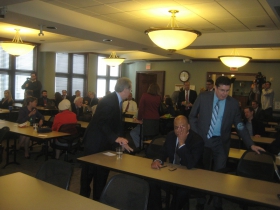
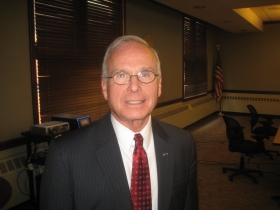
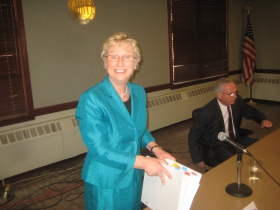




















For decades, so-called conservatives like Daley have tried to trash the name “Liberal”. The very meaning and origination of the term is liberty and freedom loving. If not for true liberals and progressive thinkers, there would be no USA, the Declaration of Independence, and US Constitution that had to set itself apart from corrupting influences of monarchies and religions of Europe during the 1700s. It seems many conservatives of today are still stuck in that time period.
“Daley says he supports the amendment, suggesting it will give the voters a say, via the justices they elect, as to who will be the court’s leader, rather than rely on seniority.”
Actually it is moving selection of the chief justice one step away from the voters since we all get to directly vote for the justice with seniority. Stop taking away our voice while pretending you are finding it for us!